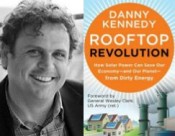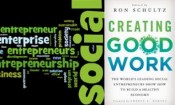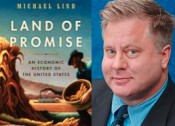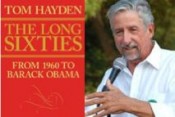Q&A w/ DANNY KENNEDY, ROOFTOP REVOLUTION: How Solar Power Can Save Our Economy and the Planet from Dirty Energy
Written on May 13th, 2013 |
Aired: 05/12/13
Is there a revolution coming to your rooftop? While opponents claim solar is expensive, inefficient, and unreliable, in his book ROOFTOP REVOLUTION: How Solar Power Can Save Our Economy And Our Planet From Dirty Energy, DANNY KENNEDY makes clear solar can save money, create jobs, and protect the environment if only politics and perception will get out of the way.
During the recent Presidential campaign, we heard a lot about Solyndra, the solar start-up that received a sizable government loan only to go belly up. Solar’s detractors claim the collapse of Solyndra proves solar is just a hippie pipe dream, but Danny Kennedy, says the truth is quite the opposite. Solyndra failed because it wasn’t able to compete in a red-hot industry, not because solar isn’t ready for prime time.
The industry employs 100,000 people in the United States, twice as many as in 2009 and twice the number of coal miners. In 2011, Warren Buffett invested $2 billion in a solar farm, and General Electric bought a start-up solar manufacturer, announcing, “By 2020 this is going to be at least a $1 billion product line.” Production of solar-generated electricity rose by 45% in the first three quarters of 2010, while electricity from natural gas rose only 1.6% and coal declined by 4.2%. Kennedy argues for a rooftop revolution to break the entrenched power of the coal, oil, nuclear, and natural gas industries and their progress-denying allies.
www.rooftoprevolutionbook.com
www.sungevity.com
Q&A: Social Entrepreneurs-Creating Good Work
Written on March 25th, 2013 |
|
Aired: 03/24/13
This week I’m joined by RON SCHULTZ, editor of a new book, CREATING GOOD WORK, that brings together essays by social entrepreneurs that share their experiences as well as their insights and advice for others. Ron has invited a few of his book’s contributors (PAUL HERMAN, founder/CEO HIP Investor Inc; JIM FRUCHTERMAN, founder/CEO Benetech; CARRIE FREEMAN, Second Muse, formerly Intel) to join us, and I want to tap each person’s individual story while asking some of these bigger questions —
What is a social entrepreneur? What’s working in the field? Why is it working? What is the larger goal or vision? Why is social entrepreneurship important? What are the big challenges? What lessons have they learned? Where can listeners learn more?
I hope someone new to the concept will understand what we’re talking about and a knowledgeable listener will learn things they can put to use.
www.creatinggoodwork.com
www.benetech.org
www.secondmuse.com
www.hipinvestor.com
Q&A: MICHAEL LIND, Co-founder of the New America Foundation; Author of LAND OF PROMISE: An Economic History of the United States
Written on March 17th, 2013 |
Aired: 03/17/13
This week’s guest, MICHAEL LIND, has written an economic history of the United States. In his new book, LAND OF PROMISE, he lays out a pattern in which the US has reinvented itself economically and politically a number of times based on the emergence of new technologies. From wind and water, to steam, to electricity and internal combustion, and finally the computer.
Each new dominant technology overwhelms the existing political and regulatory system and American government lags a generation or two behind technology-induced economic change. It takes a crisis or a war or both to overthrow the old regime and usher in the new.
When the U.S. economy has flourished, Lind argues, government, business, labor and universities have worked together as partners in a project of economic nation building. Today, as the United States struggles to emerge from the Great Recession, Land of Promise says that Americans, since the earliest days of the republic, have repeatedly reinvented the American economy-and have the power to do so again.
Q&A: JONAH SACHS, author – WINNING THE STORY WARS: Why Those Who Tell and Live the Best Stories Will Rule the Future
Written on January 14th, 2013  |
Aired: 01/13/13
My guest this week is JONAH SACHS, author of WINNING THE STORY WARS: Why Those Who Tell and Live the Best Stories Will Rule the Future. He is also Creative Director at Free Range Studios, who are responsible for many wonderful campaigns, two of which – The Meatrix and The Story of Stuff – are among the most successful videos ever in terms of viral circulation to millions. On their home page, you’ll see this quote: “Great stories make great change possible. Your world-changing message deserves to be heard – really heard. But that only happens when you learn to tell a great story.”
Q&A: TOM HAYDEN – The Long ’60s: From 1960 to Barack Obama
Written on October 31st, 2012 |
Aired 10/28/12
I haven’t done a lot about the election on this show. I’ve been talking more about the foundational issues that underlie the situation we find ourselves in — an age of very imperfect politics, government, finance, and business. Our democracy and our governance are dominated by a handful of billionaires, and a number of multimillionaires and their corporations who do not share the interests of the larger society.
But In early September I read a piece by Tom Hayden at Truthout.com. Over the next several days, it appeared all over the progressive blogosphere – Saving Obama, Saving Ourselves. I immediately contacted Tom to come on and talk about the election.
Among other things, he reminds us of the accomplishments of the first Obama administration in light of the actual political and economic circumstances he faced. He also looks at history of previous social movements. How did they interact with the political process in pursuit of their goals? And what did they gain and sacrifice in the process?
HAYDEN: “History will show that the first term was better than most progressives now think…By their nature, the achievements of social movements are lesser versions of original visions…If Obama loses, it will be unfair to blame the left, but they will be blamed nonetheless. As a consequence they will become more marginal, far less able to connect with the progressive constituencies and mass movements with vital stakes in Obama’s re-election.”
